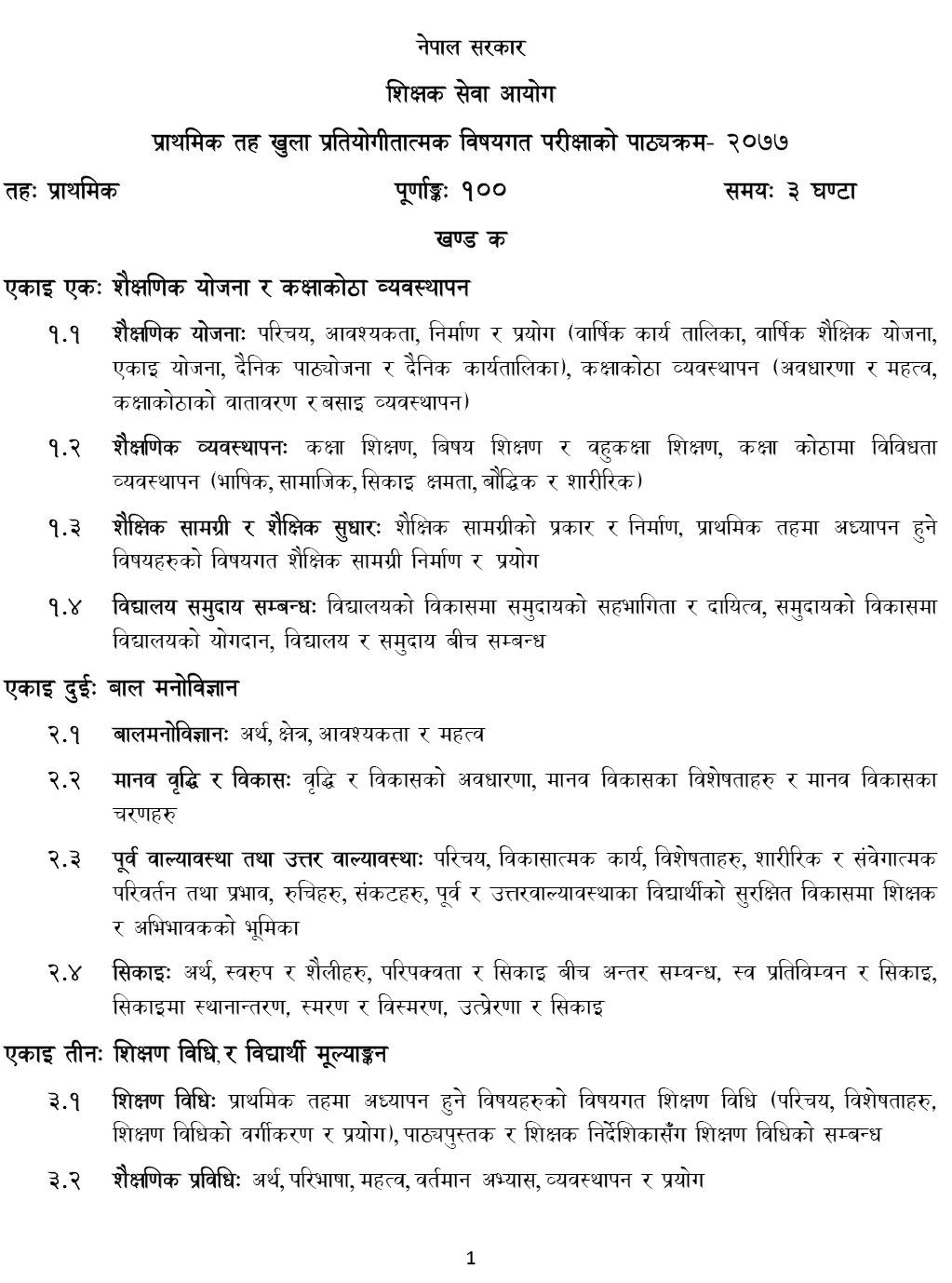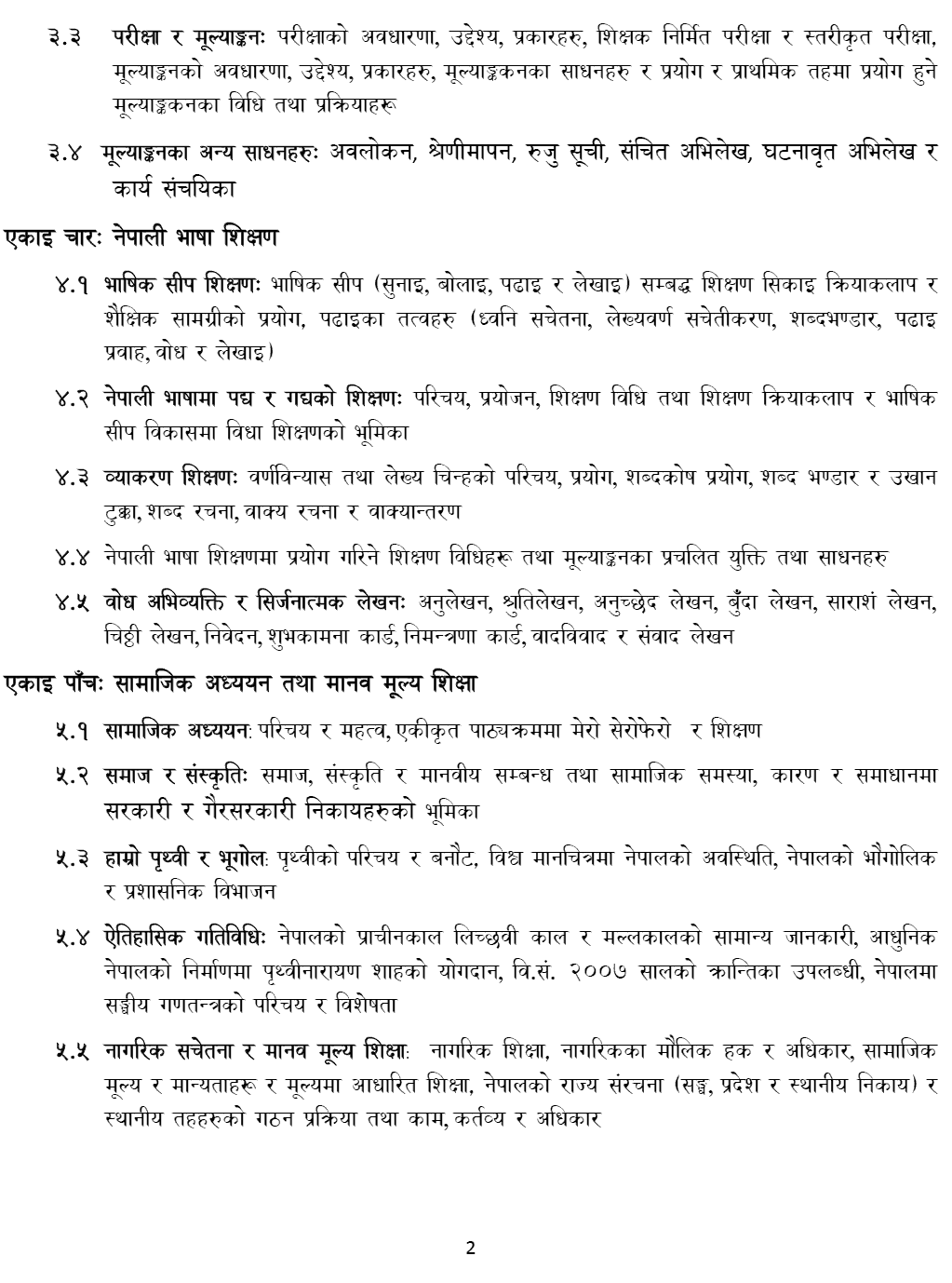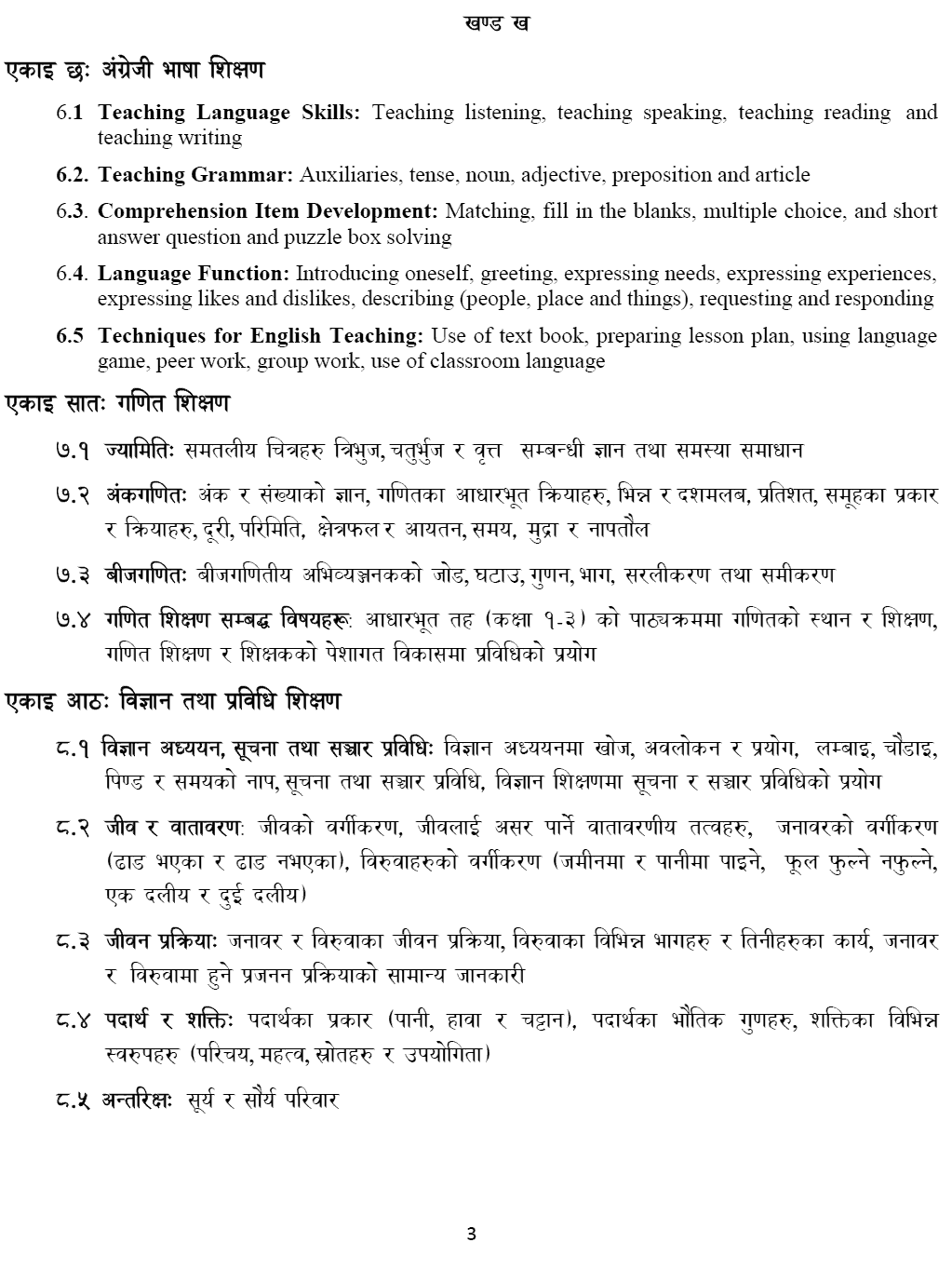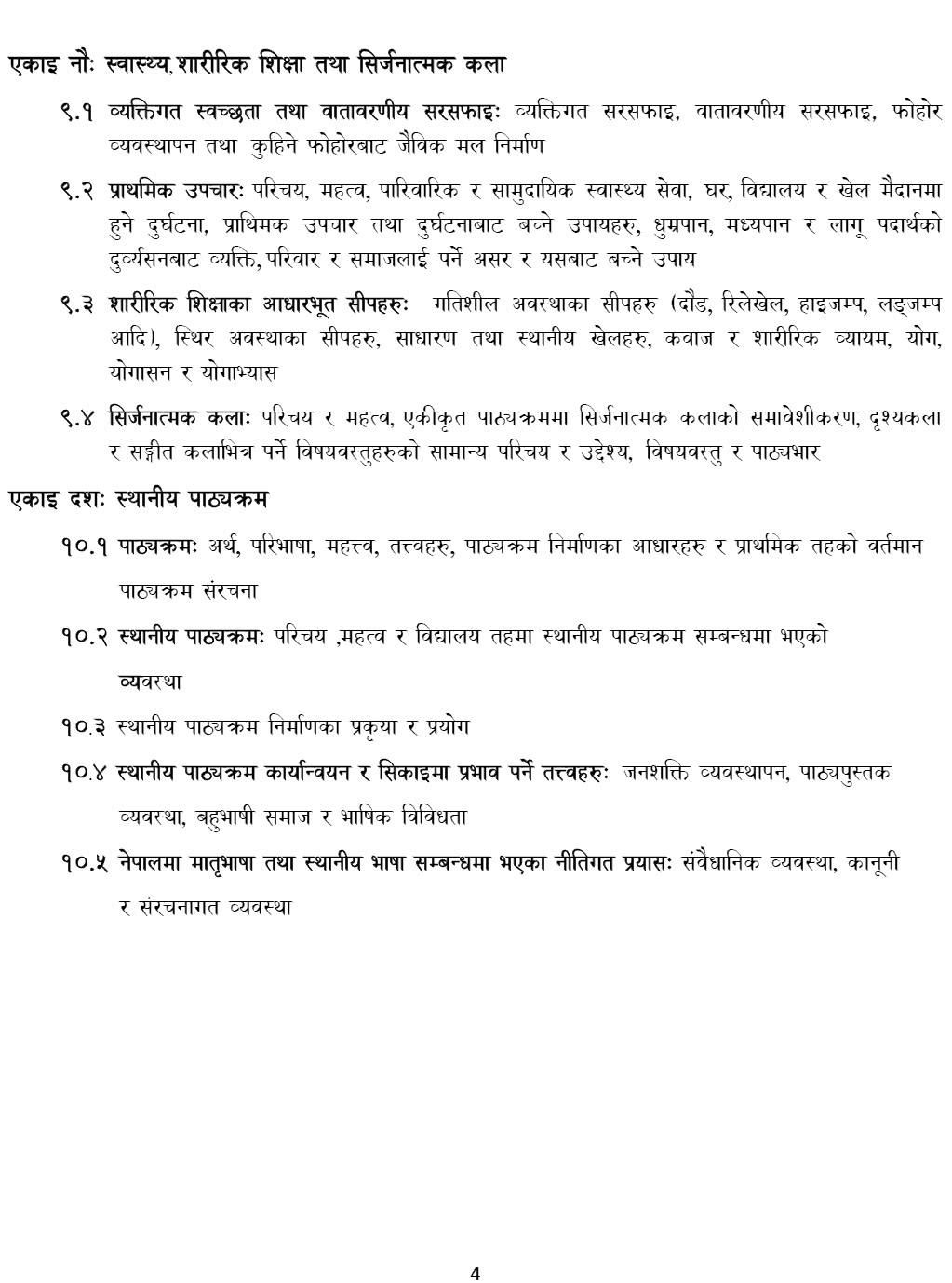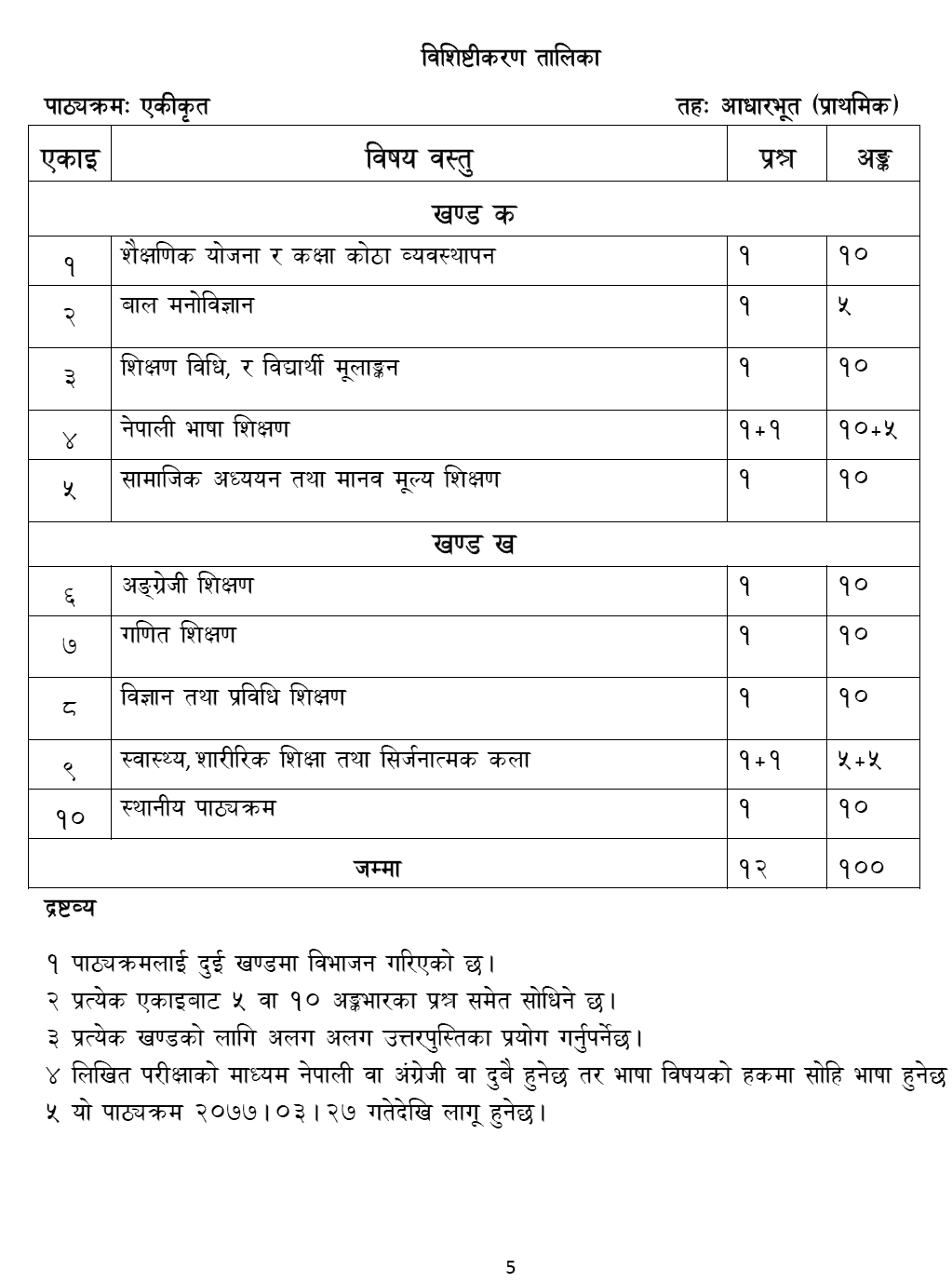
Primary Level Curriculum for Open Competitive Subjective Examination 2077
Government of Nepal, Teachers' Service Commission
Level: Primary
Marks: 100
Time: 3 hours
Section A
Unit One: Educational Planning and Classroom Management
1.1 Educational Plan: Introduction, Needs, Construction and Use (Annual Work Schedule, Annual Educational Plan, Unit Plan, Daily Curriculum and Daily Schedule), Classroom Management (Concept and Importance, Classroom Environment and Settlement Management)
1.2 Educational Management: Classroom Teaching, Subject Teaching, and Multi-Classroom Teaching, Classroom Diversity Management (Linguistic, Social, Learning Ability, Intellectual and Physical)
1.3 Educational Materials and Educational Improvements: Types and Construction of Educational Materials, Production and Use of Thematic Educational Materials for Primary Teaching
1.4 School community relations: community participation and responsibility in school development, school contribution to community development, school and community relations
Unit Two: Child Psychology
2.1 Child Psychology: Meaning, Area, Need and Importance
2.2 Human Growth and Development: The concept of growth and development, characteristics of human development and stages of human development
2.3 Pre-Childhood and Post-Childhood: Introduction, Developmental Functions, Characteristics, Physical and Emotional Changes and Impacts, Interests, Crisis, Role of Teacher and Parent in Safe Development of Pre- and Post-Childhood Students
2.4 Learning: Meaning, form, and styles, the relationship between maturity and learning, self-reflection and learning, transfer to learning, recollection and forgetfulness, motivation and learning
Unit Three: Teaching Methods, and Student Assessment
3.1 Teaching Methods: Teaching Methods of Teaching Methods with thematic Teaching Methods (Introduction, Features, Classification, and Use of Teaching Methods), Textbooks and Teacher's Guidelines
3.2 Educational technology: meaning, definition, importance, current practice, management, and application
3.3 Examination and Evaluation: Concepts, Objectives, Types of Examinations, Teacher-Made Examinations and Standardized Examinations, Concepts of Assessment, Objectives, Types, Means of Assessment and Uses and Methods and Procedures of Evaluation at Primary Level
3.4 Other Means of Evaluation: Observation, Classification, Verification List, Accumulated Records, Incident Records, and Task Sheets
Unit Four: Nepali Language Teaching
4.1 Linguistic Skills Teaching: Linguistic Skills (Listening, Speaking, Reading and Writing) Related Teaching and Learning Activities and Use of Educational Materials, Elements of Reading
4.2 Teaching of Padcha and Gadchay in the Nepali Language: Introduction, Purpose, Teaching Method and Teaching Activities and Role of Teaching in Language Skills Development
4.3 Grammar Teaching: Introduction to spelling and punctuation, usage, vocabulary usage, vocabulary and proverbial phrases, word formation, syntax, and syntax.
4.4 Teaching methods used in Nepali language teaching and prevalent assessment techniques and tools
4.5 Wisdom Expression and Creative Writing: Transcription, dictation, paragraph writing, point writing, summary writing, letter writing, petition, greeting card, invitation card, debate, and dialogue writing
Unit Five: Social Studies and Human Values Education
5.1 Social Studies: Introduction and Importance, My Serofero and Teaching in an Integrated Curriculum
5.2 Society and Culture: Society, Culture and Human Relations and the Role of Governmental and Non-Governmental Bodies in Social Problems, Causes, and Solutions
5.3 Our Earth and Geography: Introduction and Formation of the Earth, Nepal's Location on the World Map, Nepal's Geographical and Administrative Division
5.4 Historical Activities: General information of the ancient Licchavi period and Malla period of Nepal, Prithvi Narayan Shah's contribution to the construction of modern Nepal, B.Sc. Achievements of the 2007 Revolution, Introduction and Characteristics of the Federal Republic of Nepal
5.5 Citizen Awareness and Human Value Education: Citizen Education, Fundamental Rights and Rights of Citizens, Social Values and Values and Value-Based Education, State Structure of Nepal (Federal, State, and Local Bodies) and Formation of Local Levels and Functions, Duties and Rights
Unit 7: English Language Teaching
6.1 Teaching Language Skills: Teaching listening, teaching speaking, teaching reading and teaching writing
6.2. Teaching Grammar: Auxiliaries, tense, noun, adjective, preposition, and article
6.3. Comprehension Item Development: Matching, fill in the blanks, multiple-choice, and short answer question and puzzle box solving
6.4. Language Function: Introducing oneself, greeting, expressing needs, expressing experiences, expressing likes and dislikes, describing (people, place and things), requesting and responding
6.5 Techniques for English Teaching: Use of textbook, preparing a lesson plan, using language game, peer work, group work, use of classroom language
Unit 7: Mathematics Teaching
7.1 Geometry: Knowledge and problem solving related to triangles, quadrilaterals, and circles
7.2 Arithmetic: Knowledge of numbers and numbers, basic mathematical functions, fractions and decimals, percentages, group types and verbs, distance, perimeter, area and volume, time, currency, and measurement.
7.3 Algebra: Addition, Subtraction, Multiplication, Division, Simplification, and Equation of Algebraic Expressions
7.4 Mathematics Teaching Related Subjects: The place of mathematics in the basic level (grades 1-3) curriculum and the use of technology in teaching, mathematics teaching and professional development of teachers
Unit Eight: Science and Technology Teaching
8.1 Science Study, Information and Communication Technology: Discovery, Observation and Use in Science Study, Length, Width, Mass and Time Measurement, Information and Communication Technology, Use of Information and Communication Technology in Science Teaching
8.2 Organisms and the environment: Classification of organisms, environmental factors affecting organisms, classification of animals (with and without backs), classification of plants (found in land and water, flowering and non-flowering, one-party and two-party)
8.3 Life Process: Life Process of Animals and Plants, Different Parts of Plants and Their Functions, General Information on Reproductive Processes of Animals and Plants
8.4 MATERIAL AND POWER: Types of matter (water, air, and rock), physical properties of matter, various forms of power (introduction, importance, sources, and utility)
8.5 Space: The Sun and the Solar Family
Unit 9: Health, Physical Education and Creative Arts
9.1 Personal Hygiene and Environmental Hygiene: Personal Hygiene, Environmental Hygiene, Waste Management and Organic Fertilizer Production from Rotting Garbage
9.2 First Aid: Introduction, Importance, Family and Community Health Services, Accidents at Home, School and Playground, First Aid and Accident Prevention Measures, Impact of Smoking, Alcohol and Drug Addiction on Individuals, Families and Society and Prevention
9.3 Basic physical education skills: dynamic skills (dad, Relaykhel, high jump, long jump, etc.), static skills, general and local sports, Kawaj and physical exercises, yoga, Yogasana, and yoga practice
9.4 Creative Arts: Introduction and Importance, Inclusion of Creative Arts in the Integrated Curriculum, General Introduction and Objectives, Topics and Features
Unit Ten: Local Course
10.1 Curriculum: Meaning, Definition, Importance, Elements, Basis of Curriculum Development and Current Curriculum Structure of Primary Level
10.2 Local Curriculum: Introduction, importance, and provision regarding the local curriculum at the school level
10.3 Procedures and uses of local curriculum development
10.4 Factors Affecting Local Curriculum Implementation and Learning: Manpower Management, Textbook Management, Multilingual Society and Linguistic Diversity
10.5 Policy Efforts on Mother Tongue and Local Language in Nepal: Constitutional System, Legal and Structural System
Note:
1. The curriculum is divided into two sections.
2. 5 or 10 marks questions will also be asked from each unit.
3 A separate answer sheet should be used for each section.
4. The medium of written examination will be Nepali or English or both but in the case of language subject, it will be the same language.
5. This course will be implemented from 2077-03-27.



